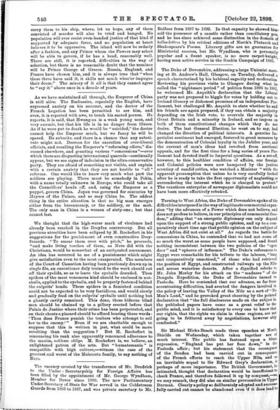Turning to West Africa, the Duke of Devonshire spoke of
the difficulties interposed in the way of legitimate commercial expan- sion "by the advances of a Power which does not believe, and does not profess to believe, in our principles of commercial free- dom," adding that "an energetic diplomacy can only depend upon the support of a strong public opinion, and up to a com- paratively short time ago that public opinion on the subject of West Africa did not exist at all." As regards the battle for concessions in China, he contended that we had not come off so much the worst as some people have supposed, and found nothing inconsistent between the two policies of the "open door" and "spheres of influence." The Duke's references to Egypt were remarkable for his tribute to the labours, "long and comparatively unnoticed," of those who had retrieved the position of Egypt, and constructed railways up the Nile and across waterless deserts. After a dignified rebuke to Mr. John Morley for his attack on the " madness " of the Dongola Expedition, the Duke of Devonshire turned to Fashoda. Here he contended that our advance, so far from accentuating difficulties, had averted the dangers involved in the policy of leaving the Valley of the Nile as a sort of "No Man's Land," and he provoked great cheering by the pointed declaration that "the full disclosures made on the subject in the published papers have come as a great relief to the public mind, and it is satisfactory to every one to know that our rights, that the rights we claim in these regions, are not going to be frittered away by negotiations, however ably conducted."










































 Previous page
Previous page